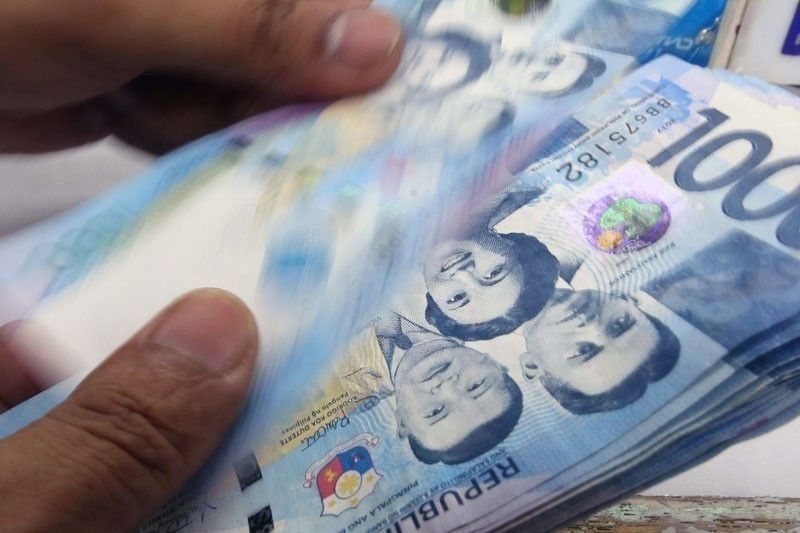Government subsidy of 13th month pay depends on funds

MANILA, Philippines — Any government decision to subsidize the 13th month pay of workers of businesses ravaged by the raging health crisis would depend on the availability of funds, Malacañang said yesterday.
Presidential spokesman Harry Roque said the Department of Finance (DOF) is waiting for more information from the Department of Labor and Employment (DOLE) on the proposal, which would require the government to spend as much as P13 billion.
“The DOF will act on that because if we do not have a funding source, even if the IATF (Inter-Agency Task Force for the Management of Emerging Infectious Diseases) approves it, nothing will happen,” Roque said at a press briefing.
“So the DOF has to act on it first and before the press briefing, I asked the DOF. It is still waiting for some information from DOLE,” he added.
Presidential Decree No. 851 requires private sector companies to pay their rank-and-file employees 13th month pay on or before Dec. 24 every year. The implementing rules and regulations of the law, however, exempt distressed businesses from the requirement.
Labor Secretary Silvestre Bello III has suggested that the government provide subsidies to businesses affected by COVID-19 lockdowns so they could provide the 13th month pay of their workers. Government-run financial institutions, Bello said, may also extend loans to the companies so they can comply with the requirement.
At the same press briefing, Roque said employees who did not report for work during the lockdown may still get yearend bonuses. He said the bonus to be given to workers would be “pro-rata based on the actual salary earned.”
“Pro rata means if you work for 12 months, you have a one-month (bonus) which is the 13th month (pay). If you worked for six months, you will get half of the 13th month pay,” Roque said.
He also said the government is reopening the economy despite the pandemic so Filipinos can return to work and continue with their livelihood.
“We believe that Filipinos should learn to live even if COVID-19 is still there. We cannot hide in caves while COVID-19 is still there, like what few people want us to do,” Roque said.
“This is also the reason why we are opening the transportation sector because if transportation remains closed, people cannot report for work,” he added.
Staggered work shifts
As part of efforts to reopen the economy, the Department of Trade and Industry (DTI) for its part is pushing for the implementation of staggered work shifts for better management of workers’ transportation needs.
Trade Secretary Ramon Lopez said at a briefing yesterday the DTI is set to issue a circular to encourage companies to implement staggered shifts.
“This means having different office hours to spread passengers and transport needs of those going to the office or places of work,” he said.
He said some employees may start their shift at 8 a.m., while some may begin at 9 a.m. or 10 a.m. or even 11 a.m.
The staggered work shift is being encouraged along with flexible work-from-home arrangements.
“We let private companies decide how to adopt the staggered work shifts because if we decide on a specific time for a particular sector or geographic place or section, it will entail a lot of consultations and time,” he said.
More sectors have been allowed by the government to resume operations.
“We can say roughly around 95 percent of sectors or a little more than that are technically allowed,” Lopez said.
Last week, the DTI issued a circular allowing travel agencies, tour operators and reservation activities to resume operations and operate at 50 percent capacity in areas under general community quarantine, and at 100 percent in areas placed under modified GCQ.
Meanwhile, over 800,000 informal workers displaced by the COVID-19 pandemic will soon have new jobs and other sources of income, according to the DOLE.
Karen Trayvilla, director of DOLE’s bureau of workers with special concern (BWSC), said more displaced informal workers can be given emergency employment with funding from Bayanihan 2.
“This is still subject to approval, but we have proposed P6-billion budget from Bayanihan 2 fund for the implementation of Tulong Panghanapbuhay sa Displaced Disadvantaged Workers Program (TUPAD) for informal workers,” Trayvilla said at a virtual forum yesterday.
With additional funding of P6 billion, Trayvilla said DOLE hopes to provide emergency employment for 863,667 displaced informal workers. She said they had initially sought only P4-billion additional funding.
She said priority beneficiaries are the more than 500,000 unserved applicants in the initial implementation of the TUPAD program.
“We are now validating the list in the regional offices of unserved applicants.” Trayvilla said, noting that only those who have not benefitted from other government assistance programs will be selected. – Louella Desiderio, Mayen Jaymalin
- Latest
- Trending






























